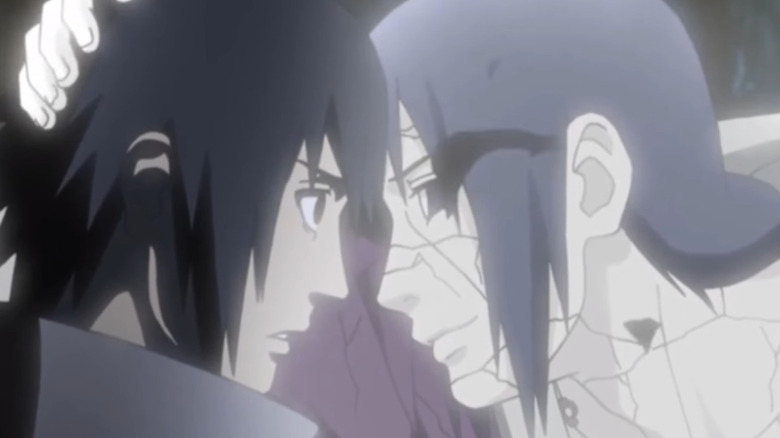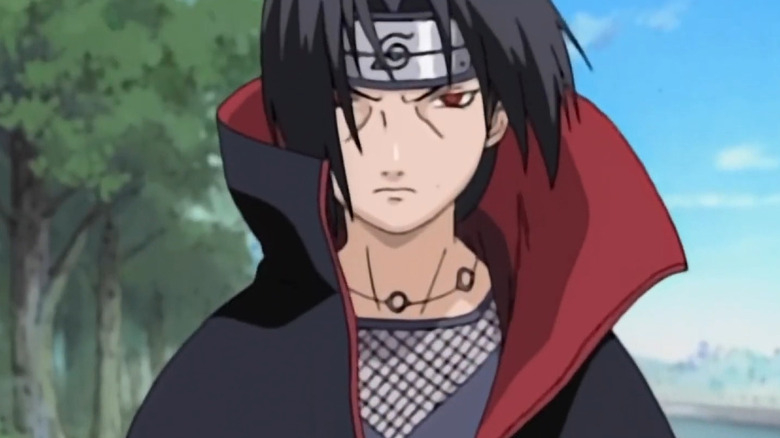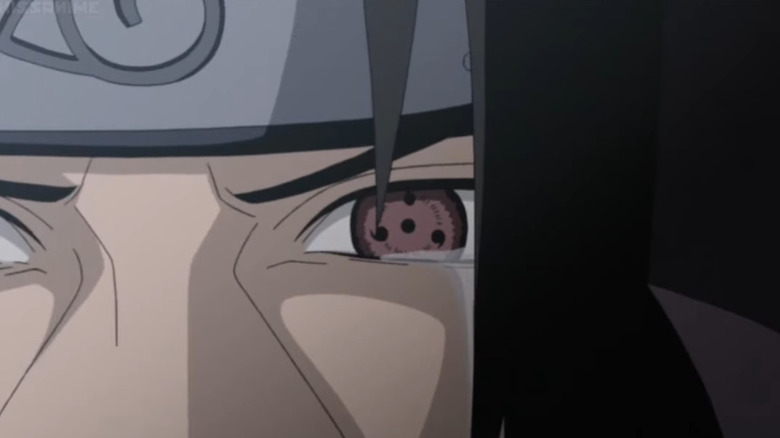Itachi's Name Holds A Darker Meaning In Naruto Than You Likely Thought
Itachi Uchiha is one of the most emotionally complex characters in "Naruto." When we first meet Itachi, he was originally propped up as an unspeakably evil ninja with incomprehensible powers. Several flashbacks helped us piece together what looked to be a psychopath who murdered his entire clan just to measure his potential and instead of ending his younger brother Sasuke's agony, he kept him alive simply to torture him.
Though fans were both engrossed and horrified by Itachi, it gave them a reason to root for Sasuke and his obsessive quest for vengeance. Itachi needed to be punished for his actions after all. In the end, however, readers and viewers soon discovered the tragic secret behind the elder surviving Uchiha. It turns out that he was given little choice and was seemingly forced into doing it to maintain peace in Konohagakure. By slaughtering his kin, he was able to prevent a civil war and saved more lives than he took. What puts this all into sobering perspective is that Itachi was a young teenager when he had to kill his parents.
Despite the many twists and turns that fans dealt with when learning about Itachi, it seems that author Masashi Kishimoto clued us in from the beginning from just his name alone. Though Itachi may just sound like a cool Japanese moniker to Westerners, in Japan, the name bears a dark meaning behind it.
Itachi means weasel, creatures associated with death
When translated from Japanese, "itachi" means "weasel," and although the stealthy little creature has no meaningful connotations in the West, Japan sees them very differently. According to JapanTruly.com, weasels in Japanese lore "are considered to be devious, evil and bad omen associated with death."
Any person with a cursory knowledge of "Naruto" would say that this perfectly describes Itachi in the early part of the series since his backstory is defined by the murder of his clansmen. This means that before the flashbacks, based on his name alone, we should have known that Itachi was the reason why Sasuke is the last Uchiha in the village.
In addition, his very first appearance in Chapter 139, following the death of Third Hokage Hiruzen Sarutobi, was meant as a warning to the village elders that he was still alive. Like an omen, Itachi wanted to remind those who helped perpetrate the Uchiha Massacre that he was still a threat to the village both physically and politically.
Itachi has a complicated backstory
Further delving into the Japanese weasel mythology, the mammals tend to have magical abilities like shapeshifting and hypnosis, which are coincidentally some of Itachi's most terrifying powers. With his clan's hereditary visual prowess, the Sharingan, Itachi had an aptitude toward illusory ninjutsu, but after unlocking the Mangekyō Sharingan, he added to his arsenal one of the series' most fearsome genjutsu, the Tsukuyomi.
Aside from his checkered history, Itachi is also a kind and caring person, especially towards his little brother. He was a pacifist who preferred to end any conflict using genjutsu and chose to decimate his clan because he desperately wanted to prevent a war from breaking out. Like most of the villains in "Naruto," Itachi is more than what is presented on the surface, which is something that his creator always wants for his villains and it seems, it starts with the name.
In a 2012 interview with VIZ Media, the U.S. translator and distributor of "Naruto," when asked about the Akatsuki, the terrorist organization that Itachi is a part of throughout the series, he explains, "I didn't want to make them just villains, because I thought there should be different reasons as to why they became outlaws against society. I wanted to explore their backgrounds just as much as I would for the heroes." With Itachi being one of the more complex and plot-dependent characters in the group, it's no wonder that he is Kishimoto's favorite in the Akatsuki.


